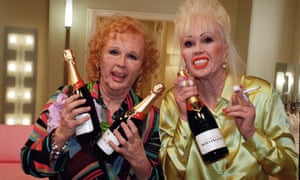‘The most disconcerting side-effects were disturbed sleep and night sweats, waking up literally wrung out, with no discernible pattern to either,” says Kirsty Wark. She sounds as measured, informed and professional as is her norm when presenting Newsnight but Wark is talking about something much more personal than current affairs: her menopause.
Wark is fronting a documentary that will air on BBC1 on Thursday: The Menopause and Me. Her involvement in the programme comes from her own sudden and unexpected experience. She had a “medical menopause” at the age of 47, after a hysterectomy and after coming off hormone replacement therapy(HRT) because of fears over its reported link to breast cancer.
“Suddenly, I had no oestrogen and the disturbed sleep and night sweats started. By the time I started making the documentary, nothing much had changed for me in 12 years and I just coped with it, as so many others do.”
But, aside from the obvious physical battle she had to endure, what Wark also struggled with was the apparent silence surrounding the menopause. In many households it is still not discussed and, in those that do broach the subject, it is often talked about in hushed tones as “the change”.
“It’s not so long ago that the hormonal changes that came with menopause were regarded as madness – the madwomen in the attic,” says Wark. “Mythology has a lot to answer for.”
Just 50 years ago, menopausal women tended to suffer alone, mortified by hot flushes and bewildered by hormonal mood swings. There was also a general acceptance that they should retire into the shadows in case it bothered anyone else. The very idea that work colleagues might know or show empathy was anathema.
It has, however, long been the subject of comedy, featuring in episodes of Father Ted and Absolutely Fabulous, as well as in routines by Les Dawson. Jennifer Saunders – who had a cancer-induced menopause – is both funny and uplifting in the Wark documentary. “There’s a moment when you realise everything’s changed,” she says. “Your metabolism, energy levels, skin, hair … so I just had a large glass of champagne and got on with it.”

Not until relatively recently has it started to be something that is not ignored or giggled at, or both – and this is partly owing to the willingness of celebrities such as Wark and others to speak openly about it.
In a recent interview with People magazine, Gillian Anderson talked about a sense of life falling apart when she experienced perimenopause, the hormonal transition prior to menopause. “All of a sudden, I felt like I could handle nothing. I felt completely overwhelmed,” Anderson said. “When I talked to the specialist, she said she often gets phone calls from female CEOs screaming, ‘I need help now! I’m losing my mind!’ I felt like somebody else had taken over my brain.”
She credits Angelina Jolie with helping change the stigma when she spoke openly about her menopause after having her breast and ovaries removed because of being genetically at risk of breast and ovarian cancer. “Perimenopause and menopause should be treated as the rites of passage that they are,” Anderson told People. “If not celebrated, then at least accepted and acknowledged and honoured.”
Cynthia Nixon, famous for her role in Sex and the City, has also been open, although she had a completely different experience from Anderson, telling the Telegraph that she and her wife are going through the menopause together. Nixon wasn’t upset, revealing: “There has been no sadness for me, because once you hit 50, you’re done.” She cites the advantages of passing childbearing age and experiencing it together. “Although I have a six-year-old, the freedom that comes from no longer being fertile is huge.”
Those differing experiences also highlight a potential problem in being more open about menopause, since symptoms can vary wildly. We have gone from a culture where it was rarely mentioned to, in some cases, one where women suffering badly ask for special consideration in the workplace. This leads to inevitable scepticism not just from men, but from other women who simply don’t suffer to the same extent and feel their colleagues should just put up with it.
Wark’s response to this is to suggest we should all be a bit kinder in the workplace if colleagues aren’t feeling well – which is possibly the best approach.
Wark’s programme is also for partners, husbands, family, friends and employers, to help give them an understanding of what women go through when they enter the menopause. Every angle is explored, with many women and one husband talking about loss of libido, weight gain, hair loss, joint pain and the almost unspeakable vaginal atrophy.
It’s also useful as a reminder that times change – everyone recognises the classic image of menopausal women as witch-like harridans exhibiting seriously odd behaviour – and that the modern menopausal women is more likely to be leading a busy and satisfying life.
Many confident, articulate women are now talking and writing about the menopause, with India Knight and Christa D’Souza producing highly entertaining books, and Miranda Sawyer writing on the subject with such penetrating honesty and empathy that you wonder if she has been poking about in your own mind.

Many women live a third of their lives post-menopausal, often at the peak of their careers and still with big plans. Medical advances are also making a huge difference to women’s experiences – and how they are seen to be dealing with it by those around them.
Wark admits she was surprised by how much she learned during the making of the programme, particularly from Dr Heather Currie, chair of the British Menopause Society and consultant obstetrician and gynaecologist at Dumfries and Galloway Royal Infirmary in Scotland. Currie also runs the Menopause Matters website.
“Discovering Heather was on HRT was an absolute eye-opener for me,” says Wark. “The US study that prompted me to come off HRT has been considerably revised and HRT only increases the risk of breast cancer if you are already predisposed. I’m back on a small dose of HRT and think I’m starting to see my sleep improve.”
Currie says a new paper by Professor Robert D Langer demonstrates that errors in the study led to 15 years of unnecessary suffering for women who stopped HRT. “There’s a better understanding of risk,” she says. “For most women who commence HRT under the age of 60, or within 10 years of the menopause, it provides more benefits than risks, including symptom control, as well as improved urogenital, bone and cardiovascular health.”
She adds: “The study didn’t show any statistically significant increased risk of breast cancer or heart disease in women using HRT, yet the highly publicised conclusions emphasised these risks. It’s hard to come back from such panic-inducing headlines but I think we are getting there, with more women talking to their GPs about the consequences of menopause and treatment options.”
WHI Study errors led to 15 years of unnecessary suffering for women who stopped HRT.
Carol Smillie, another famous face who has previously spoken openly about incontinence and periods, thinks women should not be afraid to talk with GPs, friends and family about the menopause. “We live in a far more tolerant society than our parents did,” she says. “Look how far we have come with issues like gender and disability; menopause is more openly discussed and therefore better understood now.”
It is a sentiment echoed in India Knight’s book, where she writes: “There’s a whole third of life to go. That’s not an ending – it’s a thrilling new beginning. And as you approach the years ahead, you do so at the height of your powers. You know more than you’ve ever known. You are the wisest you’ve ever been.”
THE FACTS
The menopause is when a woman stops having periods and cannot get pregnant naturally. It usually occurs between 45 and 55, as oestrogen levels decline. The average age in the UK is 51.
Common symptoms include hot flushes – sudden body temperature changes that produce heat and sweating – night sweats, irregular periods, decreased libido, vaginal dryness and mood swings.
Treatments include HRT and gabapentin, which have received mixed reviews in treating hot flushes and can have significant side-effects.
The most significant recent development is the clinical trial of a new drug carried out by Dr Julia Prague and colleagues at Imperial College London that promises the development of an effective way of reducing hot flushes. The drug is currently undergoing further trials and if these are successful it could make a considerable difference to women’s lives.
Alternative remedies include bio identicals and evening primrose oil.
‘I just coped’: Kirsty Wark on breaking the silence about menopause
Hiç yorum yok:
Yorum Gönder